
Mycotoxin Research
metrics 2024
Connecting Science and Safety in Mycotoxin Studies
Introduction
Mycotoxin Research, published by Springer Heidelberg, is a vital interdisciplinary journal dedicated to the exploration and study of mycotoxins, their impacts on health and environment, as well as strategies for mitigation. With a solid presence in the fields of Biotechnology, Microbiology, and Toxicology, it has earned a respectable Q3 ranking and continues to facilitate the dissemination of impactful research from 1985 through to 2024. The journal caters to a diverse audience, including researchers, professionals, and students, providing a platform for original research articles, reviews, and case studies that contribute to the understanding and management of mycotoxins. Although it does not offer open-access options, the journal remains a critical resource, engaging its readers with cutting-edge findings and advancements that shape the future of health and safety regarding mycotoxin exposure. With Scopus rankings reflecting its relevance—44th in Toxicology, 113th in Biotechnology, and 71st in Microbiology—Mycotoxin Research stands as an essential publication for anyone dedicated to advancing knowledge in these critical scientific domains.
Metrics 2024
 0.43
0.43 2.60
2.60 2.70
2.70 46
46Metrics History
Rank 2024
Scopus
IF (Web Of Science)
JCI (Web Of Science)
Quartile History
Similar Journals

Toxicology Communications
Advancing knowledge in toxicology for a safer tomorrow.Toxicology Communications is a vital academic journal published by Taylor & Francis Ltd, focusing on the critical field of toxicology. Established as an Open Access journal since 2017, it provides researchers, professionals, and students unrestricted access to significant findings in toxicological sciences, promoting global collaboration and knowledge sharing. The journal aims to disseminate innovative research, reviews, and case studies that explore the effects of chemical, biological, and physical agents on human health and the environment. With its commitment to high-quality publications, Toxicology Communications plays an essential role in advancing our understanding of toxicological phenomena and fostering safe practices across various industries. This makes it an invaluable resource for anyone dedicated to the studies of toxins and their environmental and health implications.

Journal of Xenobiotics
Innovating insights into xenobiotic interactions.Journal of Xenobiotics, published by MDPI in Switzerland, is an esteemed open-access journal dedicated to advancing the understanding of xenobiotic substances and their impact on environmental health and biological systems. Since its inception in 2011, the journal has made significant strides in the field, earning a prestigious Q1 ranking across categories such as Pharmacology, Pollution, and Toxicology in 2023, showcasing its pivotal role in disseminating high-quality research. With its recent Scopus rankings reflecting a solid position in Environmental Science and Pharmacology disciplines, the journal serves as a vital platform for researchers, professionals, and students interested in the mechanisms and consequences of pollutants and toxic substances in various settings. The Journal of Xenobiotics continuously fosters open collaboration and knowledge exchange, allowing for inclusive dialogue on contemporary issues, making its articles readily accessible for the global scientific community.

JOURNAL OF FOOD PROTECTION
Connecting researchers to the forefront of food protection.JOURNAL OF FOOD PROTECTION is a prominent academic journal published by Elsevier, dedicated to the field of Food Science and Microbiology. With an ISSN of 0362-028X and an E-ISSN of 1944-9097, it serves as a vital resource for researchers, professionals, and students interested in the microbiological aspects of food safety and quality. Since its inception, the journal has evolved significantly, with coverage spanning from 1977 to the present, reflecting its long-standing commitment to advancing knowledge in this critical area. Recognized for its rigorous peer-reviewed research, the journal boasts a commendable impact factor and ranks in the second quartile in Food Science and the third quartile in Microbiology according to 2023 assessments. Its Scopus ranking also highlights its relevance, with significant placements in both Agricultural and Biological Sciences and Immunology and Microbiology. The JOURNAL OF FOOD PROTECTION is an essential platform for disseminating pioneering studies that address contemporary challenges facing the food industry and public health, making it an indispensable resource in the quest for food safety and innovation.

Toxicological Research
Innovating research to unveil the mysteries of toxicology.Toxicological Research is a prominent academic journal dedicated to advancing the field of toxicology through rigorous exploration and innovative research. Published by the Korean Society of Toxicology, this journal serves as a vital resource for researchers, professionals, and students engaged in environmental science, pharmacology, and toxicology. With an ISSN of 1976-8257 and an E-ISSN of 2234-2753, Toxicological Research highlights significant findings and discussions in the realm of health, toxicology, and mutagenesis. Although not an open-access journal, it maintains a solid reputation as evidenced by its Q3 ranking in both health-related toxicology and general toxicology categories for 2023. The journal covers a broad spectrum of topics from fundamental research to applied toxicology and provides a unique platform for the dissemination of knowledge in a field that is increasingly relevant in today’s society. With an anticipated convergence period from 2008 to 2024, Toxicological Research continues to contribute vital insights to understanding the implications of toxic substances on health and the environment.
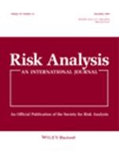
RISK ANALYSIS
Elevating Standards in Risk Analysis and ManagementRISK ANALYSIS is a premier journal published by Wiley, focusing on the critical intersection of safety, risk, reliability, and quality within the fields of engineering and physiology. With a strong standing reflected in its Q1 category ranking in Safety, Risk, Reliability and Quality and Q2 in Physiology (medical), this journal is a vital resource for researchers, professionals, and students eager to stay informed on the latest methodologies, theories, and applications surrounding risk assessment and management. Since its inception in 1981, RISK ANALYSIS has been instrumental in shaping the discourse in its fields, garnering a robust reputation verified by its high rankings on Scopus, where it is positioned in the 85th percentile in Safety and the 77th percentile in Medicine. Though it does not currently offer Open Access options, the journal remains essential for those committed to advancing their understanding of risks associated with complex systems. For more insights, RISK ANALYSIS is available to readers throughout its converged years extending to 2024, solidifying its role as a foundational journal for impactful research.

Food Analytical Methods
To advance the frontiers of food analytical methodologies.Food Analytical Methods, published by Springer, is an esteemed journal dedicated to the innovative field of analytical methodologies within the food sciences. With an ISSN of 1936-9751 and E-ISSN of 1936-976X, this journal serves as a pivotal platform for researchers and professionals to exchange insights, methodologies, and findings related to food quality analysis, safety measures, and innovative technologies in food science. As of 2023, Food Analytical Methods boasts impressive Scopus rankings, including Q2 in Analytical Chemistry and Food Science, positioning it among the top journals in its category. The journal's commitment to enhancing food safety and quality through rigorous research underscores its importance in both academic and industrial applications. Although it does not currently operate under an open-access model, it provides exceptional value through its rigorous peer-review process and comprehensive publication standards, further inviting contributions from both established and emerging scientists in the field. With coverage spanning from 2008 to 2024, this journal continues to address critical research areas, thereby shaping the future of food analytics.
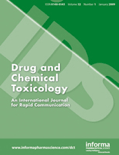
DRUG AND CHEMICAL TOXICOLOGY
Advancing safety through toxicological insights.Drug and Chemical Toxicology is a well-respected journal in the fields of toxicology, pharmacology, and public health, published by Taylor & Francis Ltd. Since its inception in 1978, this journal has diligently explored the effects and mechanisms of chemical exposures on health and the environment, fulfilling a crucial role in advancing scientific understanding and safeguarding public health. The journal is indexed across prestigious databases and features an impressive array of articles categorized within the Q2 and Q3 quartiles across various categories in 2023, reflecting its significance in Chemical Health and Safety as well as Environmental and Occupational Health disciplines. With an extensive reach and a focus on interdisciplinary research, Drug and Chemical Toxicology offers a rich repository of original research, reviews, and methodological advancements, catering to a diverse audience of researchers, professionals, and students dedicated to the betterment of safety and health standards. Although not an open-access publication, its articles are widely accessible to the academic community, ensuring that critical innovations and insights are shared for the greater good.
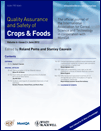
Quality Assurance and Safety of Crops & Foods
Transforming research into actionable food safety practices.Quality Assurance and Safety of Crops & Foods is a leading peer-reviewed journal, published by CODON PUBLICATIONS, dedicated to advancing the fields of Agronomy and Crop Science and Food Science. Since its inception in 2009, this journal has established itself as a crucial platform for researchers, professionals, and students, focusing on the vital intersection of agricultural safety and food quality. With a commendable impact factor and a current Scopus ranking placing it in the top quartiles of its field (Q2 in 2023), it serves as an essential resource for those committed to ensuring the safety and quality of global food supplies. The journal provides open access options to enhance the dissemination and accessibility of research findings, thus fostering collaborative efforts to tackle contemporary challenges in food production and safety. By showcasing innovative methodologies and cutting-edge research, Quality Assurance and Safety of Crops & Foods not only contributes to scientific discourse but also plays a pivotal role in informing policy and practice in sustainable agricultural practices.
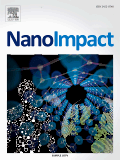
NanoImpact
Connecting the Dots Between Nanoscience and Societal ImpactNanoImpact, published by Elsevier, is a pioneering journal dedicated to advancing the understanding of nanotechnology's impact across various fields such as materials science, public health, environmental safety, and risk management. Launched in 2016, the journal has quickly established itself as a premier outlet for high-quality research, evidenced by its top-tier quartile placements in several categories, including Q1 rankings in Materials Science (Miscellaneous) and Public Health as of 2023. With a significant Scopus ranking, including #34 in Public Health and #12 in Safety, Risk, Reliability, and Quality, NanoImpact aims to foster interdisciplinary collaboration and innovation among researchers and practitioners. As an invaluable resource for both emerging scholars and seasoned professionals, the journal encourages the exploration of both the beneficial and adverse effects of nanomaterials, bridging the gap between scientific inquiry and real-world applications. Access to cutting-edge research insights through this publication is crucial for anyone invested in the future of technology and its societal implications.
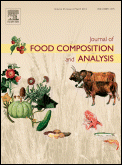
JOURNAL OF FOOD COMPOSITION AND ANALYSIS
Exploring Innovative Methodologies in Food AnalysisJOURNAL OF FOOD COMPOSITION AND ANALYSIS, published by Academic Press Inc. Elsevier Science, is a leading peer-reviewed journal in the field of Food Science, recognized for its substantial impact on advancing research and knowledge within the discipline. With a commendable Q1 quartile ranking in the 2023 category of Food Science and a Scopus rank of 86/389, this journal holds a prestigious position, emphasizing its significance in crop and food quality research. The journal's scope encompasses a wide range of studies related to food composition, nutrition, and analytical methodologies, aiming to foster innovation and knowledge dissemination in food science. Although it operates under a subscription model, it remains an essential resource for researchers, professionals, and students seeking credible and cutting-edge findings. Established in 1987, the JOURNAL OF FOOD COMPOSITION AND ANALYSIS continues to be at the forefront of food science, contributing to the understanding of food quality and nutrition standards globally.